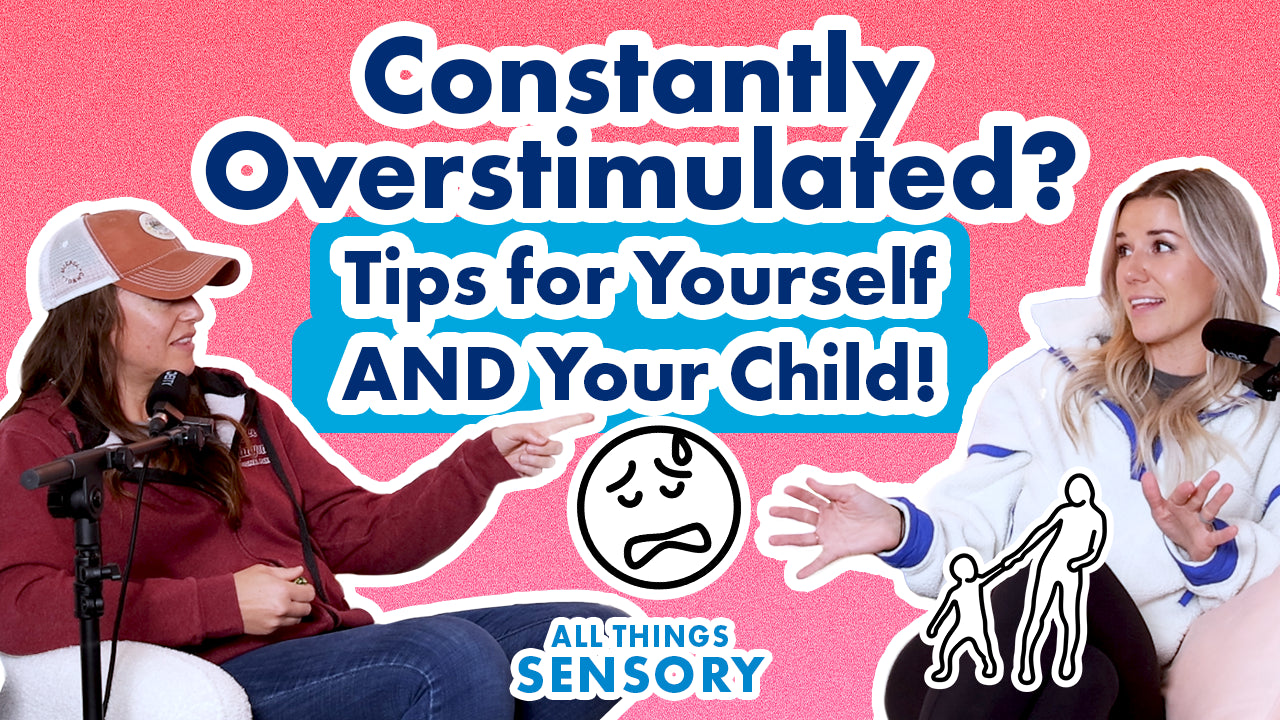Your Cart is Empty

Shop our BIGGEST sale of the year!https://harkla.co/pages/black-friday-cyber-monday
Today we are answering a listener question: how to help a 5-year-old who becomes overstimulated and how to help the parent who becomes overstimulated. We discuss strategies to set the child up for success before the overstimulating situations, strategies for the car ride, and how to decompress. We also talk about strategies for the parent, including getting outside, drinking enough water, asking for help, and more!
Check out all of the links below!
We’d love to answer your questions on the podcast! Fill out this form ->https://harkla.typeform.com/to/ItWxQNP3
All Things Sensory Podcast Instagram
Harkla Website - Shop Sensory Products!
When Your Child’s Sensory Preferences Don’t Match Yours
Book: Building a Non-Anxious Life
Book: Too Loud, Too Bright, Too Fast, Too Tight
Sensory Strategies for Teens and Adults
Parenting a child with sensory processing challenges can be an emotional and complex journey. Whether your child has a sensory processing disorder (SPD), ADHD, or undiagnosed needs, finding strategies to help them thrive can feel overwhelming—especially if their needs differ from your own.
Sensory avoidance occurs when a child’s nervous system is overly sensitive to certain stimuli. Instead of seeking more sensory input, like a sensory seeker, sensory avoiders withdraw, sometimes becoming overwhelmed by their environment.
Interestingly, this can look like sensory seeking—louder voices, chaotic behaviors—but it’s often an attempt to block out overwhelming sensations. Understanding this nuance is crucial to helping your child feel safe and supported.
Before diving into strategies, take time to reflect on the unique qualities you love about your child.
Highlighting these traits strengthens your bond and gives you a lot of patience to draw from during challenging moments.
OT Tip: Spend 10–15 minutes daily engaging in their preferred activities. Let them take the lead, whether building Legos or imaginative play and focus solely on being present with them.
Many sensory avoiders thrive with structure. Before heading to potentially overwhelming situations like grocery stores or birthday parties, explain the plan:
A visual schedule or checklist can be beneficial for younger children.
OT Tip: Identify how long your child can tolerate an environment before becoming overstimulated. For example, if they typically struggle after 20 minutes, plan to leave after 15 to help avoid meltdowns.
A sensory diet involves a series of activities tailored to your child’s sensory needs, helping them stay regulated throughout the day. Incorporate these into your child’s routine:
OT Tip: Include yourself in the sensory diet! Taking walks, doing yoga, or even crawling exercises can also help regulate your nervous system.
Retained primitive reflexes, like the Moro reflex, may contribute to sensory challenges. Testing for these reflexes and integrating them through targeted exercises can significantly improve behavior and sensory regulation.
OT Tip: Harkla’s free primitive reflex webinar provides an excellent starting point for understanding and addressing these reflexes.
Sometimes, small lifestyle changes can have a significant impact on sensory regulation:
Teach your child simple ways to communicate their feelings before they become overwhelmed. Practice using code words or hand signals to indicate when they need a break, like "when I feel too noisy inside, I can chew gum or go to my calm corner.”
Pro Tip: Rehearse these strategies during calm moments so they become second nature when needed.
Parenting a sensory avoider is not easy, but seeing them thrive with the right tools and strategies is rewarding. Remember, it’s not about fixing your child but helping them confidently navigate the world. Take it one day at a time, and celebrate small wins.
BORING, BUT NECESSARY LEGAL DISCLAIMERS
While we make every effort to share correct information, we are still learning. We will double check all of our facts but realize that medicine is a constantly changing science and art. One doctor / therapist may have a different way of doing things from another. We are simply presenting our views and opinions on how to address common sensory challenges, health related difficulties and what we have found to be beneficial that will be as evidenced based as possible. By listening to this podcast, you agree not to use this podcast as medical advice to treat any medical condition in either yourself or your children. Consult your child’s pediatrician/ therapist for any medical issues that he or she may be having. This entire disclaimer also applies to any guests or contributors to the podcast. Under no circumstances shall Rachel Harrington, Harkla, Jessica Hill, or any guests or contributors to the podcast, as well as any employees, associates, or affiliates of Harkla, be responsible for damages arising from use of the podcast.
Keep in mind that we may receive commissions when you click our links and make purchases. However, this does not impact our reviews and comparisons. We try our best to keep things fair and balanced, in order to help you make the best choice for you.
This podcast should not be used in any legal capacity whatsoever, including but not limited to establishing “standard of care” in a legal sense or as a basis for expert witness testimony. No guarantee is given regarding the accuracy of any statements or opinions made on the podcast.
Comments will be approved before showing up.